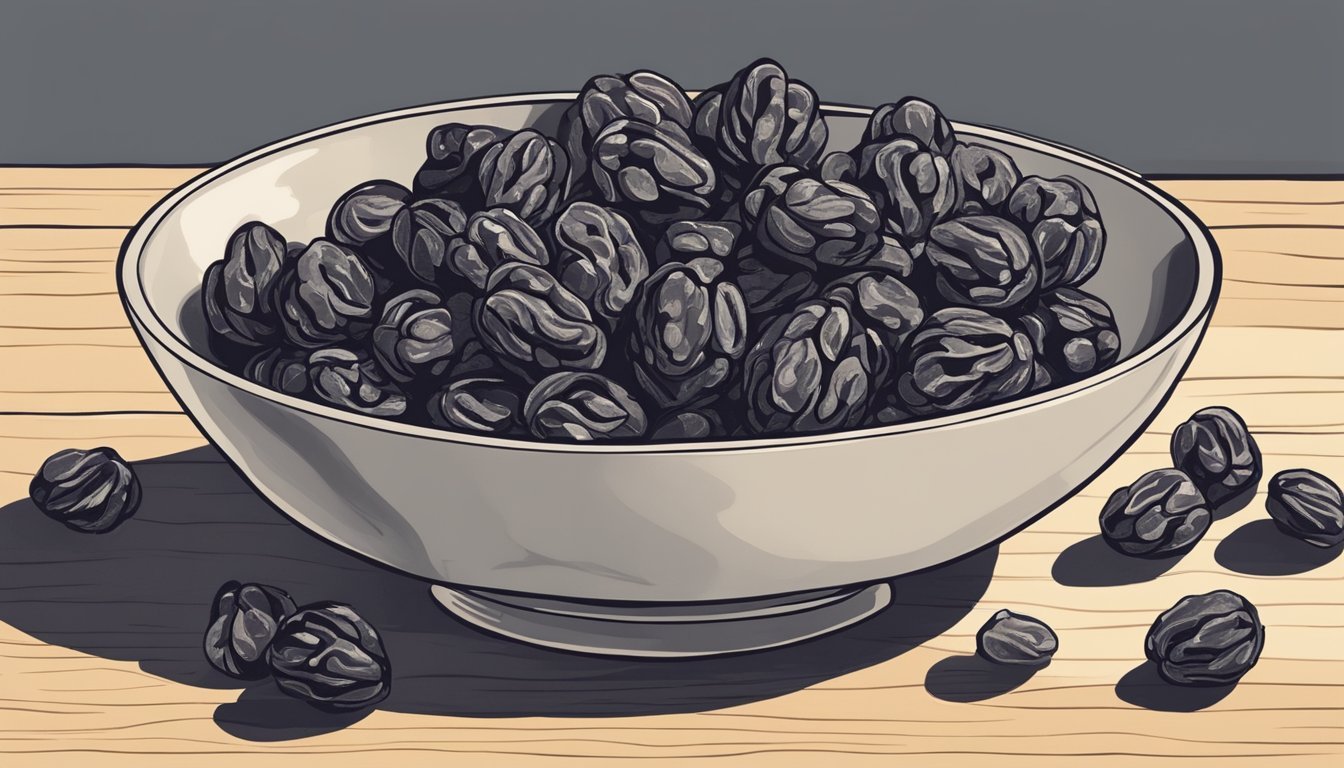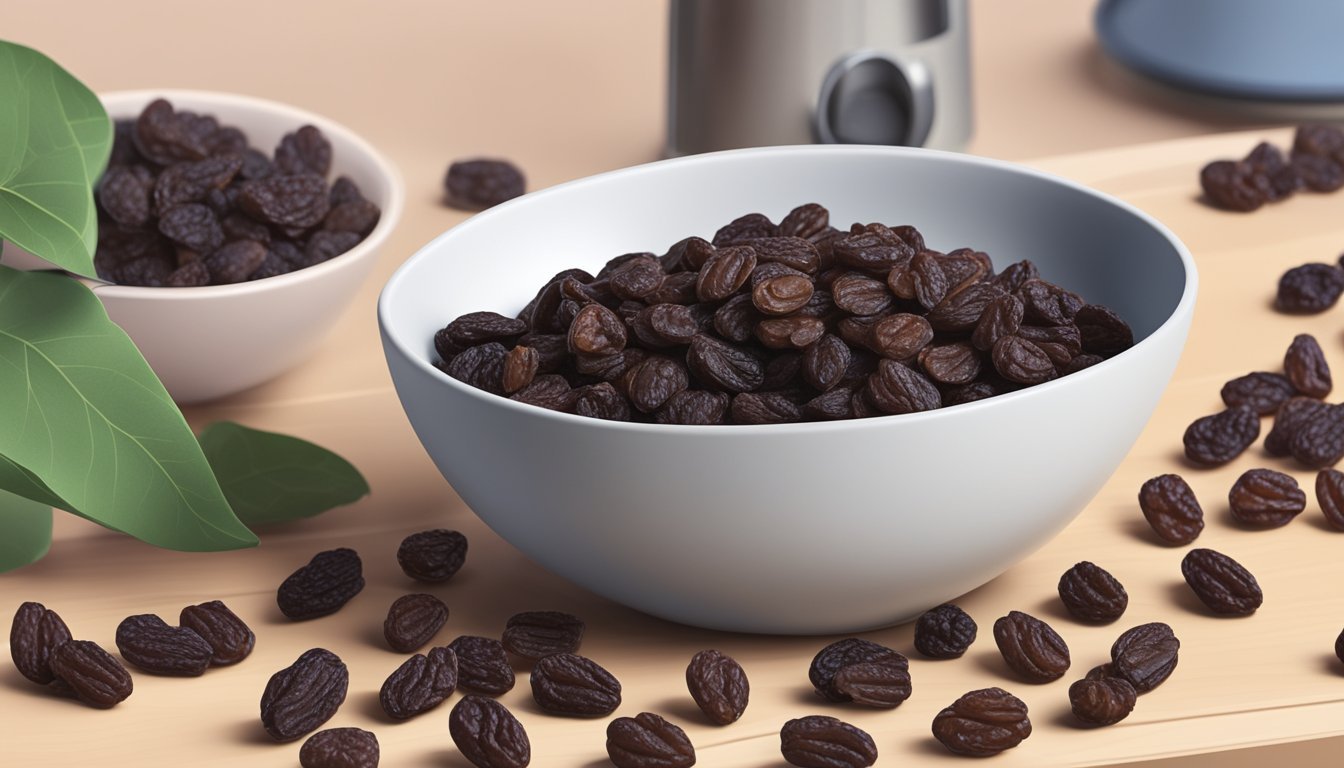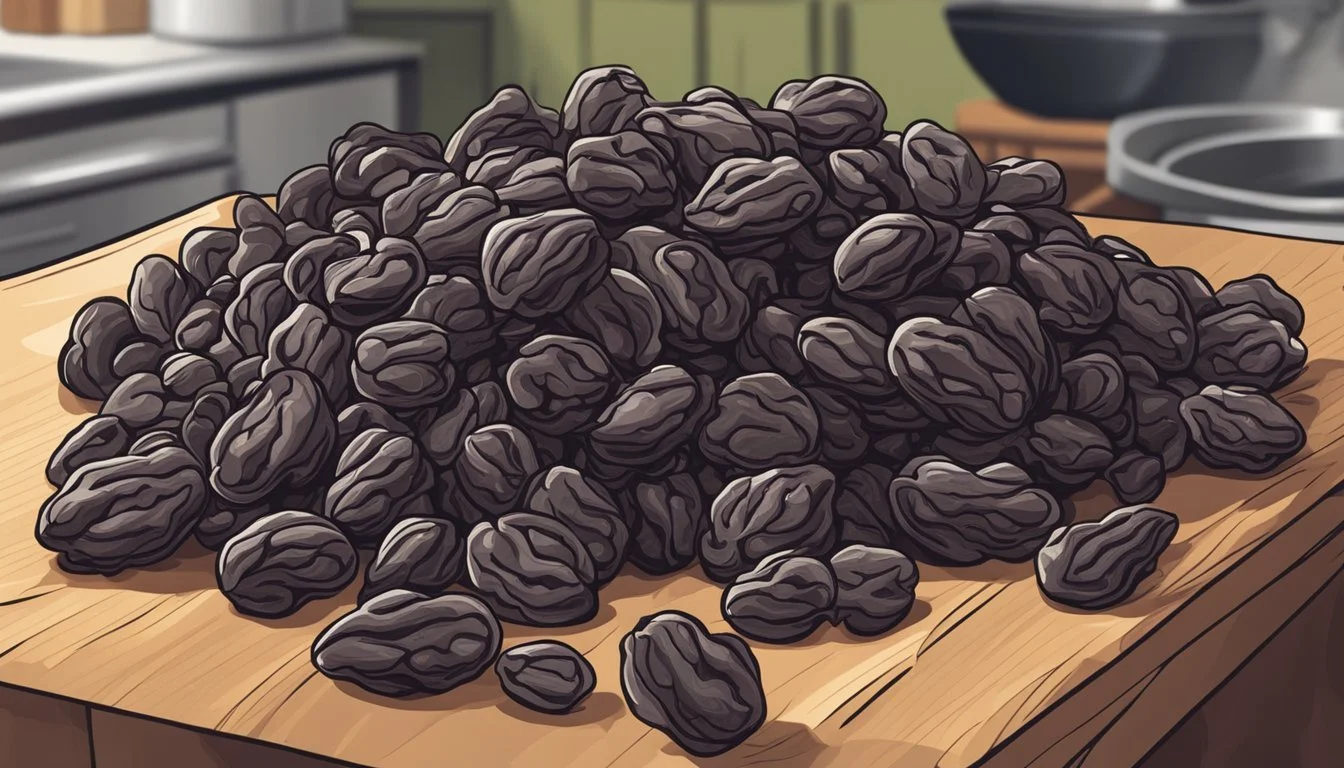How Long Do Raisins Last?
Shelf Life and Storage Tips
Raisins, the dried version of grapes, are known for their sweet taste and long shelf life. Due to the dehydration process, they lack the moisture content that would typically facilitate bacterial growth and spoilage in fresh fruit. Consequently, raisins can last a significant amount of time when stored properly. Each package of raisins typically comes with a "best by" date which suggests the time frame within which they retain optimal quality.
The shelf life of raisins in their original, unopened packaging generally extends to about 12 months. However, they can remain safe to consume and maintain their flavor for an additional period after the expiration date, which may range from 3 to 12 months depending on storage conditions. It's important to note that "best by" dates are mostly indicators of quality rather than safety; thus, raisins can be edible past this date.
Storage conditions are pivotal in extending the shelf life of raisins. Keeping them in a dry and cool environment helps preserve their quality. Raisins with preservatives such as sulfur dioxide will generally last longer than those without additives. In instances where the packaging is opened, the raisins' shelf life may be reduced, but they can still last much longer than many other snacks if sealed and stored properly after each use.
Raisin Fundamentals
Raisins are essentially dried grapes known for their long shelf life due to the drying process. This section delves into what constitutes a raisin and the advantages of dry preservation.
Understanding Raisins
Raisins originate from grapes that have been dehydrated, either naturally under the sun or through artificial means. Dehydration reduces the fruit's moisture content, inhibiting the growth of microorganisms that cause spoilage. Different types of grapes yield various raisin varieties; organic raisins are made from grapes that have been grown without synthetic pesticides or fertilizers.
Shelf life of unopened raisins in pantry: 6 months to 1 year
Shelf life of opened raisins in pantry: up to 6 months
Preservatives: Some raisins include preservatives such as sulfur dioxide to extend shelf life.
Benefits of Dry Preservation
The dry preservation of raisins not only concentrates their sugars and flavors but also enhances their shelf life. Dried fruit like raisins can often maintain taste and nutritive value over extended periods, making them a reliable and nutritious snack option.
Sulfur dioxide: A common preservative that can extend the shelf life even further.
Without preservatives: Raisins can last 3 to 12 months past their expiration date if stored properly.
By understanding these key points, one can ensure that their raisins maintain quality and longevity.
Storing Raisins
Proper storage of raisins extends their shelf life, maintaining their quality and freshness. Understanding ideal conditions and the correct use of containers are essential.
Ideal Storage Conditions
Raisins should be stored in a cool, dry place such as a pantry to preserve their quality. They typically last well for up to 6 months when stored under ideal conditions.
Effects of Temperature and Humidity
Exposure to high temperatures and humidity accelerates the degradation of raisins. Refrigeration can help extend their lifespan, while freezing is suitable for very long-term storage. Light exposure should be minimized, so storing them in a dark environment is beneficial.
Using Airtight Containers
Storing raisins in airtight containers helps protect them against moisture and other contaminants. Options for containers include glass or mason jars, canning jars, and resealable plastic bags. If raisins are kept in their original packaging, ensuring that the pack is properly sealed after opening is crucial. When using a freezer for storage, it's necessary to pack the raisins in freezer-safe containers to avoid freezer burn.
Shelf Life and Quality
In terms of longevity, raisins are known for their extended shelf life, which can be influenced by storage conditions and packaging. Recognizing spoilage and understanding the differences between unopened and opened packages further ensures quality preservation.
General Shelf Life Expectancy
Raisins, when stored under ideal conditions, maintain their quality and flavor for a considerable length of time. The general shelf life expectancy for raisins is approximately 12 months if kept in their original packaging in a dry environment. Beyond the expiration date, they may remain edible for another 3 to 12 months, although their optimal quality in terms of flavor might diminish.
Indicators of Spoilage
Raisins can indeed go bad, despite their reputation for a long shelf life. Indicators of spoilage include:
Changes in color: Any drastic color change may signify that the raisins are past their prime.
Off odor: A sour or unusual smell is a clear indicator of spoilage.
Taste: If the flavor is noticeably off or has a fermented taste, the raisins should be discarded for quality concerns.
Unopened vs. Opened Packages
The shelf life of unopened raisin packages generally extends beyond that of opened ones due to reduced exposure to moisture and contaminants. Unopened raisins can stay fresh for up to:
3 months after the best by date.
Opened packages, on the other hand, should be consumed more quickly to maintain quality. Once opened, it's advised to store raisins in an:
Airtight container
Away from heat and moisture to last up to six months beyond the best by date.
Exposure to air and humidity after opening can lead to staleness, impacting both the taste and texture, thus reducing overall quality.
Preventing Spoilage
Proper storage techniques are essential to prevent the spoilage of raisins. Controlling the environment where raisins are kept can significantly extend their shelf life by reducing risks of mold growth and pest infestation.
Protecting Raisins from Pests and Mold
To safeguard raisins from pests and mold, storage in an airtight container is crucial. Ensuring the container is sealed prevents insects and contaminants from reaching the dried fruit. For added protection, some individuals store their raisins in the freezer, where the low temperature inhibits both mold and pest activity.
Tips for Pest and Mold Prevention:
Store in a sealed, airtight container.
Consider freezing for long-term storage.
Check regularly for signs of moldy spots or unusual odors.
Importance of Cool, Dry Storage
Maintaining a cool and dry environment is key to extending the shelf life of raisins and preventing spoilage. Heat and humidity are prime contributors to the deterioration of dried fruits. Storage away from these elements, preferably in a dark and cool place, helps preserve the quality of the raisins. The ideal temperature for storage is typically between 50-70°F (10-21°C), with low humidity levels.
Storage Conditions:
Temperature: 50-70°F (10-21°C)
Humidity: Low
Location: Dark, away from direct sunlight
By carefully controlling the storage conditions, one can significantly reduce the potential for spoilage, ensuring that raisins remain a safe and enjoyable food item for consumption.
Advanced Preservation Techniques
Advanced preservation methods can significantly extend the shelf life of raisins by controlling temperature and oxygen exposure. These techniques involve refrigeration, freezing, and vacuum sealing, each with its distinct advantages and methodologies.
Refrigeration Benefits and Downsides
Refrigeration slows the growth of microorganisms and the rate of chemical changes in food. Raisins, when refrigerated, can maintain their quality for longer due to the consistent and cool temperatures in a refrigerator. An ideal temperature is between 35°F to 40°F (1.6°C to 4.4°C). One should store raisins in airtight containers to prevent moisture absorption and odor transfer from other foods. However, refrigeration may not be necessary for short-term storage as raisins have a naturally long shelf life due to their low moisture content.
Long-Term Freezing
Freezing raisins can extend their usability to a great extent, potentially preserving them for years. To effectively freeze raisins, one should spread them out on a baking sheet for a pre-freeze and then transfer them into airtight containers or freezer bags, ensuring they're sealed properly to avoid freezer burn. Freezer temperatures (0°F or -18°C) halt bacterial growth entirely. Frozen raisins might slightly change in texture but can be easily thawed at room temperature before consumption.
Vacuum Sealing and Oxygen Absorbers
Vacuum sealing coupled with oxygen absorbers offers the longest shelf life extension for raisins. By removing air from sealed containers and bags, vacuum sealing prevents oxidative reactions and moisture changes, two main factors in food spoilage. Oxygen absorbers further reduce residual oxygen levels, thereby inhibiting growth of aerobic organisms and preventing rancidity. When raisins are vacuum-sealed, they can be stored in a pantry, refrigerator, or freezer to complement the benefits of temperature control. It's crucial that the vacuum sealer is of good quality to ensure an effective and lasting seal.
Health and Consumption
When incorporating raisins into one's diet, it is essential to understand their health benefits and how they fit into various recipes. Raisins offer nutritional value but also contain natural sugars which need to be considered in the context of a balanced diet.
Raisins in a Healthy Diet
Raisins, being dried grapes, preserve most of the nutrients and are a good source of antioxidants. They contain essential minerals such as potassium and iron, and a modest amount of fiber which is beneficial for digestive health. However, they are high in natural sugars, which calls for moderate consumption, especially for those monitoring their sugar intake.
Nutritional Content Per ¼-Cup Serving:
Calories: 120
Protein: 1g
Total Fat: 0g
Carbohydrates: 32g
As a healthy snack, raisins can contribute to an individual's daily fruit intake. They are convenient and non-perishable, which makes them an excellent option for on-the-go snacking. However, due to their sugar content, portion control is essential.
Using Raisins in Recipes
In cooking and baking, raisins add a natural sweetness to recipes, which can reduce the need for added sugars. Whether incorporated into baked goods like oatmeal raisin cookies or savory dishes such as Moroccan tagines, they bring texture and flavor complexity to meals.
Tips for Cooking and Baking with Raisins:
Hydrate raisins before using them in cooking to prevent them from absorbing too much moisture from the dish.
Add raisins to salads or cereals for added sweetness and a textural element.
When baking, balance the sweetness of raisins with spices like cinnamon or nutmeg to enhance the flavor profile.
While raisins are versatile and enrich recipes, it is wise to remember they are more concentrated in sugars and calories than fresh fruit due to the drying process, and therefore, they should be used mindfully in cooking and baking.
Recognizing Spoiled Raisins
To maintain health and safety, it is essential to know how to identify spoiled raisins. Spoilage can occur due to various factors, and recognizing bad quality is crucial to prevent food poisoning.
Visual and Olfactory Indications
Visual Signs: Spoiled raisins often exhibit certain visual cues that signify they are no longer good to eat. These signs include:
Mold: If raisins have white or green fuzzy spots, they likely have mold growing on them.
Discoloration: Any significant changes in color, such as darkening or lightening, might indicate spoilage.
Texture Changes: Raisins that are overly hard, or have become unusually sticky and clumped together, might be past their prime.
Smell: A sour or off odor is a clear indicator that raisins have gone bad. Fresh raisins should have a sweet and slightly fruity scent. Any other smells suggest they're no longer safe for consumption.
Potential for Food Poisoning
Consuming spoiled raisins that harbor bacteria or microbes can lead to food poisoning. It's important to understand that while dried fruits like raisins don't expire in the same way as fresh produce does, they can still harbor harmful pathogens if not stored correctly. If you suspect that the raisins have been exposed to moisture or contaminants, or if they exhibit any of the aforementioned visual or olfactory signs, they should be discarded to avoid health risks.
Frequently Asked Questions
When it comes to prolonging the shelf life of raisins and ensuring they retain their taste and quality, several key practices can be utilized. These include proper storage techniques and understanding the conditions under which raisins are best kept.
Can Raisins be Stored Without Refrigeration?
Raisins can be stored without refrigeration and will remain in good condition when kept in a cool, dry place such as a pantry. Airtight containers are ideal for maintaining their quality, protecting them from moisture and other contaminants.
How to Maximize Raisin Shelf Life?
To maximize raisin shelf life, one should store them in airtight containers to prevent dehydration and keep them away from direct sunlight and heat. For extended storage, keeping raisins in a cool environment, such as a refrigerated setting, can further preserve their freshness.
Are Frozen Raisins Still Tasty?
Freezing raisins can preserve their taste and prevent spoilage for a longer period. When frozen raisins are thawed, they maintain much of their original flavor, making them a viable option for long-term storage without significant loss in quality.
Conclusion
Raisins, the dried form of grapes, offer longevity and convenience as a shelf-stable snack. They generally have a considerable shelf life, typically ranging from six to twelve months when unopened. Properly storing raisins is essential to maximize their quality and extend their usability; it is best to keep them in a cool, dry place away from direct sunlight.
Once opened, raisins should be placed in an airtight container to retain their freshness. Under these conditions, they can remain suitable for consumption for up to six months. However, raisins can sometimes last for an additional year beyond their expiry date if the package remains sealed and storage conditions are optimal.
Although raisins are naturally high in sugar and less prone to spoilage, it's crucial to inspect their condition regularly. Signs of degradation include:
Hard texture
Loss of color
Off odors
Presence of mold or insects
Consumers can often trust their senses to determine the edibility of raisins. Eating spoiled raisins may pose health risks; therefore, vigilance is vital when evaluating their quality. It should be emphasized that while raisins may not spoil quickly, their nutrient content, particularly vitamins, may diminish over time.
In summary, storing raisins in the right conditions is key to maintaining their taste, safety, and nutritional value. With proper storage, raisins offer a durable food choice for the health-conscious consumer seeking a balance of convenience and longevity.






